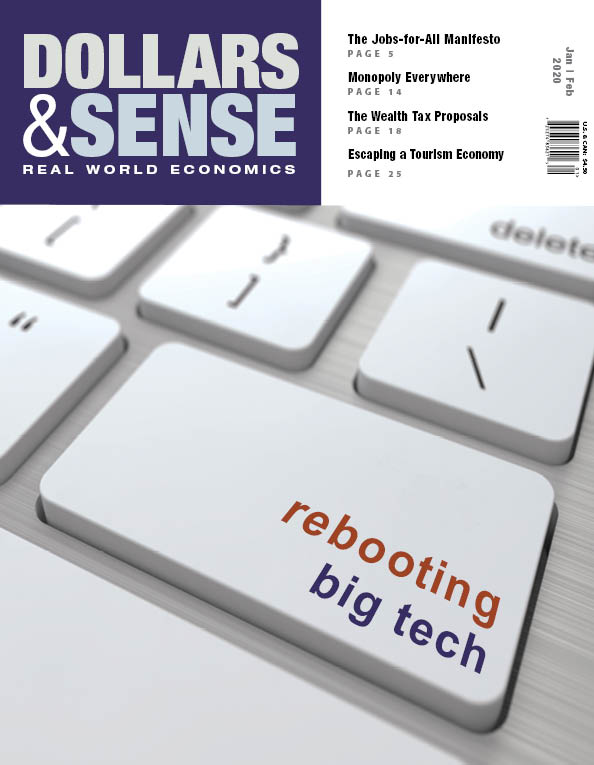Fighting Climate Change in Portlandia
Not only is failure not an option, those fighting to avert cataclysmic climate change have achieved important successes worthy of celebrating.

Our (very late, but very timely) January/February 2020 issue is at the printers and we've sent out full-color pdfs to e-subscribers. (Not a subscriber? You can subscribe online here!)
Here is the p. 2 editors' note for the issue:
In this issue’s cover feature, Rob Larson lays out how the tech giants became so big and powerful, in particular how “network effects” led to market concentration for the big “platform companies”—the firms that provide indispensable digital foundations on which businesses and individuals must operate. As Larson explains, there are several ways of dealing with the tech monopolies, including not just antitrust, but also regulation and nationalization. Larson also points to a potential socialist alternative, building on “platform cooperativism,” that would move toward worker- and user-control of these platforms.
Monopoly in the U.S. and global economies is most obvious in Big Tech, where massive and powerful corporations have spread around the world through a combination of network effects and the lax antitrust laws that allowed, and even encouraged, rampant mergers and acquisitions over recent years. But monopoly pervades more than just Big Tech in the U.S. and global economies, as Armağan Gezici shows in her feature article, with extreme market concentration in industries ranging from pharmacy chains and home improvement stores to chemicals, seeds, and beer. Non-economists can be forgiven for being confused when economists of all stripes use the term “monopoly” beyond its technical definition (a market with only one seller) to refer more broadly to the kind of market power and reduced competition that comes with market concentration and reduction to just a few sellers or a few buyers. So the recent approval of a merger between telecom companies Sprint and T-Mobile will reduce the already monopolistic industry from four major wireless providers to just three—technically an “oligopoly,” but still considered an example of a monopolized market.
According to Gezici, the trend toward monopoly is part and parcel of the neoliberal paradigm, “which tends to see rising market power as the inevitable result of top firms gaining market share by adopting new technologies that increase their efficiency.” Mainstream economists tell us this is all good for consumers and for the economy, but the same period of market concentration, while delivering high corporate profits, has also seen “slower capital accumulation marked by weak investment, declining labor share of income, and lower aggregate productivity growth, signaling a slowing down in technological progress and dynamism.”
This monopolized, neoliberal economy is an engine for massive inequality. Market concentration can drive up prices (e.g., Big Tech’s monopoly rents—that premium you pay for Microsoft’s copyright) and drive down wages (e.g., when Walmart dominates a labor market, or when monopolists force workers to sign “noncompete” agreements). The monopolists amass vast fortunes while the rest of us earn lower wages and pay higher prices. Barry Deutsch’s cartoon in this issue echoes Arthur MacEwan’s column in the last issue in underlining how the system (including copyright law) is rigged in favor of the wealthy and corporations. Monopolies are part of the rigging, and addressing them will require restructuring the system so it works better for ordinary people.
What can we do about massive inequality in the meantime? John Miller’s “Up Against the Wall Street Journal” feature addresses another way of coping with massive inequality: wealth taxes. Miller explains why the criticisms of recent wealth tax proposals—the hyperventilating ones from ideologues and also the more careful criticisms from mainstream economists—don’t fly. Contra their critics, wealth taxes would be economically effective, but just as importantly, they would be politically effective, since they poll well across party lines.
Also in this issue: a Jobs-for-All Manifesto; Gerald Epstein’s contribution to our series on neoliberalism and what might come next; Dr. Dollar on alternatives to tourism-based economies; and more!